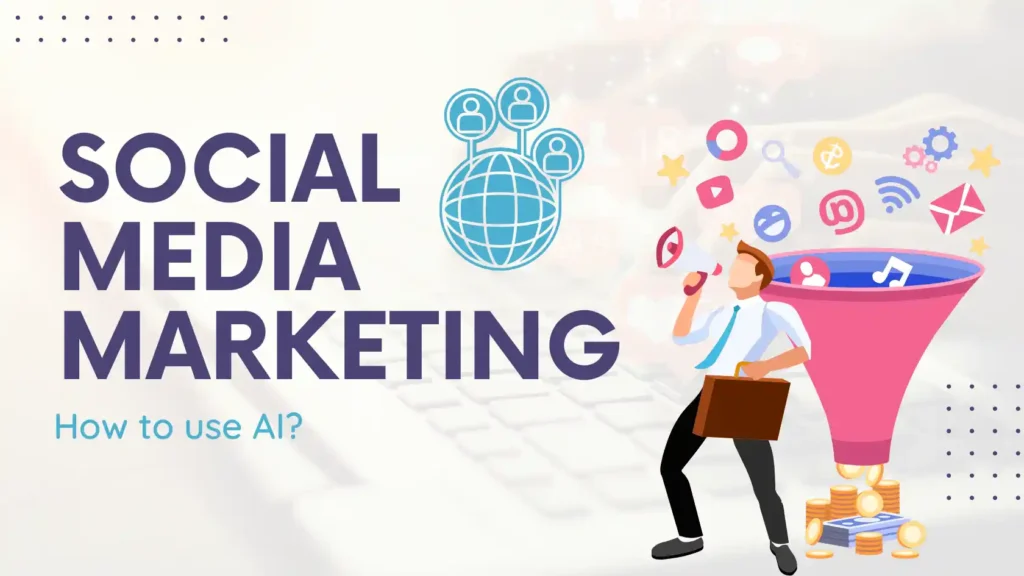As technology evolves, artificial intelligence (AI) is becoming an essential tool in social media. By leveraging AI, we can streamline content creation, enhance user engagement, and analyze data more effectively than ever before.
This not only saves time but also improves the quality of our interactions online. Understanding these capabilities can significantly elevate our social media strategies.

/Source: Getty Images
In this article, we will explore various ways to implement AI in our social media efforts. From automated content generation to personalized user experiences, we have numerous options available to us. As we dive deeper, we will also consider ethical implications and the future of AI in this dynamic field.
Whether we are marketers, business owners, or simply social media enthusiasts, the insights shared here will help us harness the power of AI for better outcomes in our digital presence.
Key Takeaways
- AI improves our content creation and management processes.
- Personalized experiences enhance user engagement and support.
- The future of social media will increasingly rely on AI technologies.
The Rise of AI in Social Media

/Source: Generated with Midjourney AI
Artificial Intelligence (AI) has become an important part of social media. We see AI driving the way brands connect with their audiences. Its ability to analyze data quickly helps tailor content to individual needs.
Machine Learning, a subset of AI, enhances user experiences. Platforms use algorithms to recommend content based on our preferences. This makes feeds more engaging and relevant.
AI also supports content creation. Tools like ChatGPT help marketers generate posts more efficiently. This saves time and boosts creativity. Many companies are adopting AI-driven strategies for their social media campaigns.
Another area where AI shines is customer service. Chatbots can handle inquiries 24/7, providing instant responses. This improves user satisfaction and frees up human resources for more complex tasks.
As we look to the future, the role of AI in social media will likely grow. Businesses that embrace these technologies may find themselves ahead in a competitive market. The integration of AI tools allows us to optimize strategies and achieve better results.
In summary, the rise of AI in social media is transforming how we interact and engage. By leveraging these technologies, we can enhance our outreach and connect with audiences more effectively.
Understanding AI Technologies

/Source: Generated with Midjourney AI
Artificial intelligence (AI) technologies play a crucial role in enhancing user experiences on social media. Through various advanced techniques, we can streamline processes and create more engaging content. Below, we explore key areas of AI that significantly impact social media.
Machine Learning and Algorithms
Machine learning allows systems to learn from data and improve over time without explicit programming. In social media, algorithms analyze user behavior to provide personalized content. This includes viewing habits, interactions, and even timing of posts.
We can leverage machine learning for activities like content recommendations and ad targeting. For instance, platforms can predict what posts users are likely to engage with, thus increasing interaction rates. Generative AI is also becoming important here. It can produce creative content based on learned patterns from user data.
Natural Language Processing
Natural language processing (NLP) helps computers understand human language. In social media, NLP enables features like sentiment analysis, chatbots, and content moderation. We can identify user sentiment toward posts and products by analyzing comments and feedback.
Chatbots powered by NLP can provide quicker customer service by answering questions around the clock. This technology allows platforms to filter harmful or inappropriate content, ensuring a safer online environment. As we harness NLP, we can improve communication between users and platforms.
Computer Vision and Facial Recognition
Computer vision allows computers to interpret and process visual data. In social media, we use this technology to analyze images and videos, enhancing user engagement. An example is the automatic tagging of friends in photos, which relies on facial recognition.
We can also create filters and effects by analyzing visual data in real time. These applications help platforms create a more interactive user experience. While beneficial, the use of facial recognition brings up privacy concerns, which need addressing as we move forward in AI implementation.
AI-Enhanced Content Strategies

/Source: Generated with Midjourney AI
Artificial intelligence transforms how we approach content strategies in social media. By utilizing AI tools, we can improve content creation, personalize user experiences, and efficiently manage our content schedules. These enhancements allow us to engage our audience more effectively.
Content Creation and Generation
We can leverage generative AI tools to streamline the content creation process. These tools can produce text, images, and videos based on specific prompts, helping us generate ideas quickly. For instance, using AI, we can create engaging social media posts or blogs tailored to our audience’s interests.
Additionally, AI can analyze trending topics within our niche. This analysis helps us craft content that resonates with our followers. We can also test variations of content to find the most effective styles and formats. The result is a more efficient content creation process that drives higher engagement.
Content Personalization and Recommendations
AI plays a crucial role in personalizing content for our audience. We can use AI algorithms to analyze user behavior and preferences, allowing us to deliver tailored recommendations. This personalization can include suggested posts, articles, or products that align with individual user interests.
Moreover, chatbots powered by AI can engage with users directly, offering personalized responses and content suggestions. This interaction not only improves user experience but also increases the likelihood of users sharing our content. By embracing these technologies, we create a more relevant and enjoyable experience for our audience.
Automating Content Scheduling and Management
Efficiently managing our content schedule is essential for maintaining a consistent social media presence. AI tools can help automate the scheduling of posts across various platforms, ensuring that our content reaches our audience at optimal times.
These tools analyze engagement metrics to determine when our audience is most active. By scheduling posts effectively, we can maximize reach and engagement. Additionally, AI can automatically adjust our content calendar based on real-time performance data, allowing us to stay agile and responsive to trends.
Incorporating AI in our social media strategies enhances our ability to manage content effectively while maximizing engagement with our audience.
Social Media Management with AI

/Source: Generated with Midjourney AI
Incorporating artificial intelligence into social media management significantly enhances user experience and data analysis. We can leverage these tools to streamline processes and make informed strategic choices.
Improving User Experience
AI tools help us create more engaging and personalized experiences for our audience. By using chatbots, we can respond to customer inquiries instantly, ensuring they receive timely support. These bots can handle FAQs and provide information around the clock.
Additionally, AI algorithms analyze user behavior to suggest content that resonates with specific audiences. This results in tailored posts that boost interaction and retention rates. AI also simplifies the scheduling of posts, allowing us to optimize timing based on when our audience is most active. By anticipating user needs, we foster a stronger community and increase our brand’s visibility.
Data Analysis for Strategic Decisions
Through advanced data analysis, AI provides insights that inform our marketing strategies. We can monitor engagement metrics like likes, shares, and comments to understand what content works best. These insights help us tailor future campaigns to enhance effectiveness.
AI also assists in identifying trends that may affect our brand. By analyzing current interactions and emerging topics, we can pivot our content strategies proactively. Utilizing predictive analytics, we forecast outcomes based on past data, improving our decision-making process.
With the right tools, we turn raw data into actionable insights, driving targeted campaigns that align with our goals. This data-driven approach ultimately leads to improved engagement and customer satisfaction.
AI-Driven User Engagement and Support

/Source: Generated with Midjourney AI
We leverage AI in social media to enhance user engagement and streamline customer support. Through tools like chatbots, businesses can efficiently communicate with users while providing timely responses. This technology not only improves customer service but also fosters a positive experience for users.
Chatbots for Customer Service
AI-powered chatbots have transformed how we handle customer service. These tools provide instant responses to user inquiries, reducing wait times and improving satisfaction. They can handle a variety of questions, from basic to more complex issues.
For example, a chatbot can assist users in navigating a website or provide answers about products. Advanced chatbots use natural language processing to understand user intent better. They can also learn from previous interactions, making them smarter over time.
Using chatbots can significantly free up human agents to focus on more complicated issues. This efficiency leads to a more organized and responsive customer service framework. Many businesses are now adopting this technology to maintain a high level of customer support.
Supporting User Engagement through AI
AI plays a crucial role in boosting user engagement on social media platforms. By analyzing user behavior, we can create personalized content that resonates with our audience. This targeted approach keeps users interested and encourages them to interact more frequently.
Additionally, AI helps in scheduling posts for optimal engagement times. Tools can analyze when users are most active, ensuring our content reaches them when they are online. We can also use AI to monitor user interactions, allowing us to adjust our strategies based on real-time feedback.
Furthermore, AI-driven insights allow businesses to track trends and adapt accordingly. This adaptability keeps our content fresh and relevant, maintaining user interest over time. By investing in AI technology, we foster meaningful interactions that enhance the overall user experience.
Ethical Considerations in AI Usage

/Source: Generated with Midjourney AI
When we use artificial intelligence in social media, ethical issues arise that need our attention. Key concerns include algorithmic bias and content moderation, as well as privacy issues with the tools we employ. These aspects are essential for creating a fair and responsible social media environment.
Algorithmic Bias and Content Moderation
Algorithmic bias can significantly impact how content is filtered and moderated on social media platforms. AI algorithms may favor certain voices or perspectives, leading to unfair treatment of underrepresented groups. This bias often stems from the data used to train these AI systems, which reflects existing societal prejudices.
To address this, we must implement strategies such as:
- Diverse Training Data: Incorporating a wide range of perspectives can help reduce bias.
- Regular Audits: Monitoring algorithms regularly ensures they function fairly and justly.
By proactively managing algorithmic bias, we can enhance the accuracy and fairness of content moderation.
Privacy Concerns with AI Tools
The use of AI tools in social media raises significant privacy concerns. Many platforms collect vast amounts of user data to improve their AI systems, which can lead to unauthorized use or data breaches. These practices can erode user trust and raise questions about consent.
To safeguard privacy, we should prioritize:
- Data Encryption: Protecting user data through strong encryption methods.
- Transparency Policies: Clearly communicating how user data is utilized and shared.
By addressing these privacy concerns, we can create a more secure environment for all users engaging with AI in social media.
Measuring the Impact of AI

/Source: Generated with Midjourney AI
We can clearly see how artificial intelligence shapes our social media strategies. By measuring its impact, we can understand both the benefits and how it affects user experience and engagement.
Benefits of AI in Social Media
AI offers various advantages in social media management. For example, it enables automated content creation, which saves us valuable time. This allows us to focus on more strategic tasks.
Additionally, AI enhances social listening. We can gather insights from user interactions to tailor our content more effectively. This data helps us identify trends and user preferences, allowing us to make data-driven decisions.
Moreover, AI improves targeted advertising by analyzing user behavior. This targeted approach increases conversion rates and boosts our return on investment.
Evaluating User Experience and Engagement
To assess user experience, we should look at metrics like engagement rates and feedback. AI can analyze comments and reactions to understand user sentiment. This enables us to refine our approach and improve our content.
Engagement metrics, such as shares and likes, provide insight into what resonates with our audience. We can use AI tools to track these metrics over time. This helps us recognize patterns and adjust our strategies accordingly.
Furthermore, user experience can be enhanced through AI-driven chatbots. These bots improve response times and cater to user needs efficiently. By streamlining interactions, we can provide a more satisfying experience for our audience.
Future Trends in AI for Social Media

/Source: Generated with Midjourney AI
As we look ahead, the role of artificial intelligence in social media is set to evolve significantly. Two key trends stand out: the rise of generative AI in creating visual content and the changing landscape of influencer marketing through AI technologies.
Generative AI and Visual Content
Generative AI is transforming how we create and share visual content. This technology allows us to produce unique images, videos, and graphics quickly. For instance, platforms using AI can generate visuals tailored to specific audiences, enhancing engagement.
Now we can craft personalized marketing materials by analyzing user preferences. Generative AI enables us to create videos that resonate more deeply with viewers. Tools are available that simplify the video creation process, allowing brands to tell their stories vividly.
Benefits of using generative AI include:
- Efficiency: Speeding up content production
- Customization: Tailoring visuals to audience interests
- Cost-effective: Reducing the need for extensive design resources
The Evolution of Influencer Marketing
Influencer marketing is increasingly enhanced by AI. We are seeing how AI-powered tools help identify and connect with influencers whose audience aligns with our brand.
By analyzing data and engagement metrics, AI assists in selecting the most effective influencers. This data-driven approach optimizes our campaigns, ensuring a better return on investment.
AI can also track campaign performance in real-time. Insights gained from this data enable us to adjust strategies quickly. This agility helps us stay ahead in a fast-paced social media environment.
The future of influencer marketing includes:
- Data-Driven Selections: Finding the right influencers
- Real-time Adjustments: Adapting strategies on the go
- Targeted Campaigns: Reaching the right demographic more effectively

/Source: Generated with Midjourney AI






